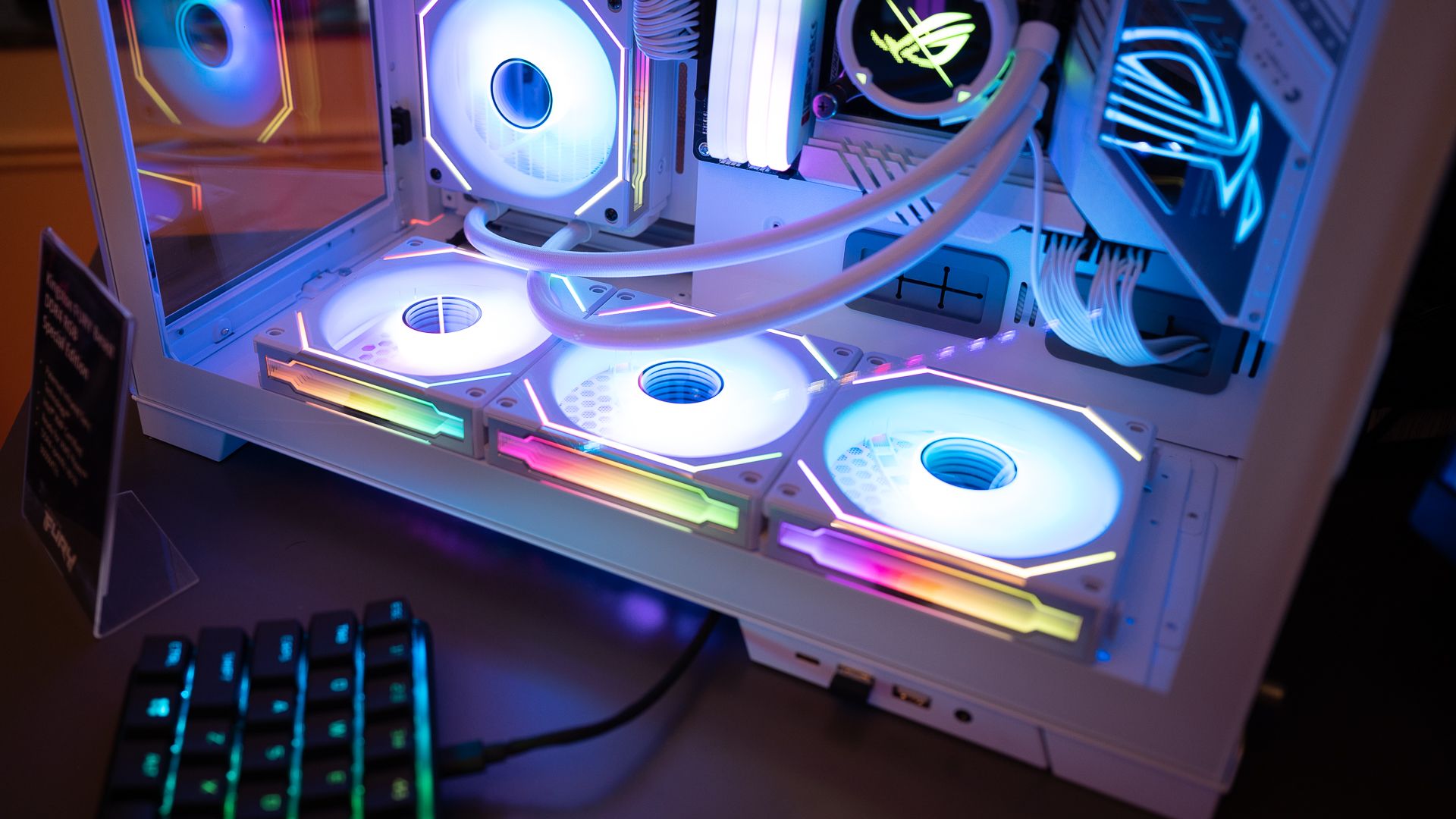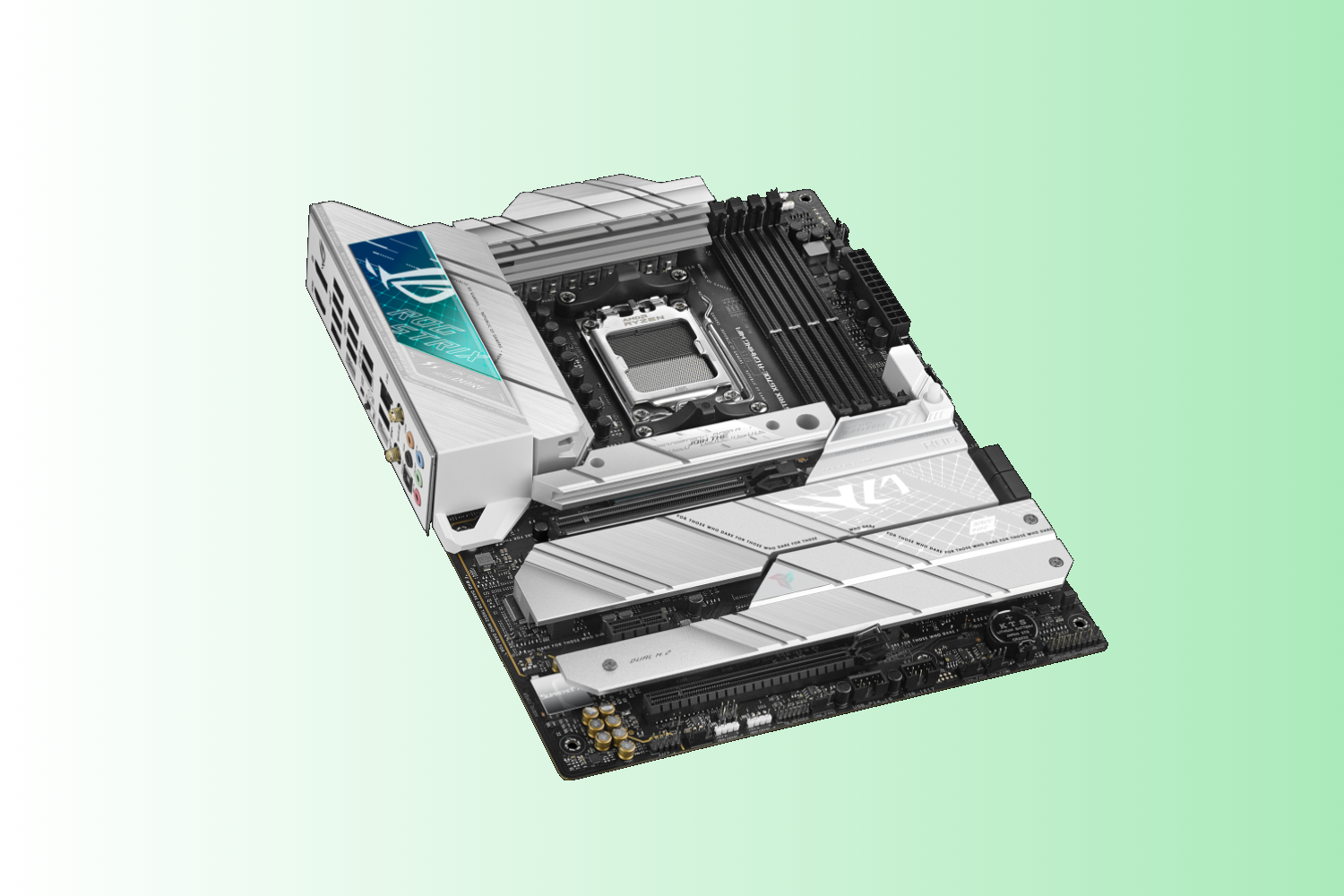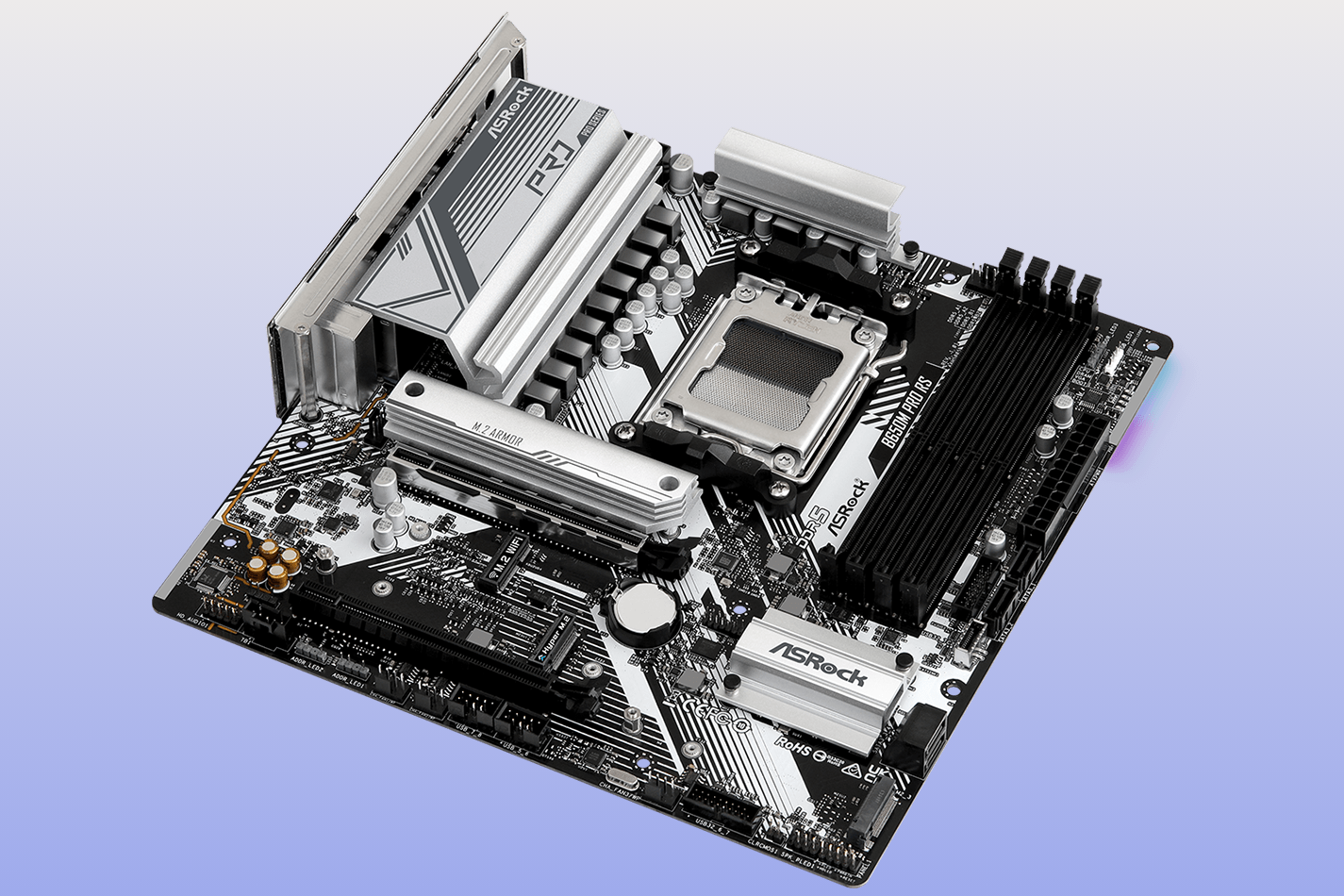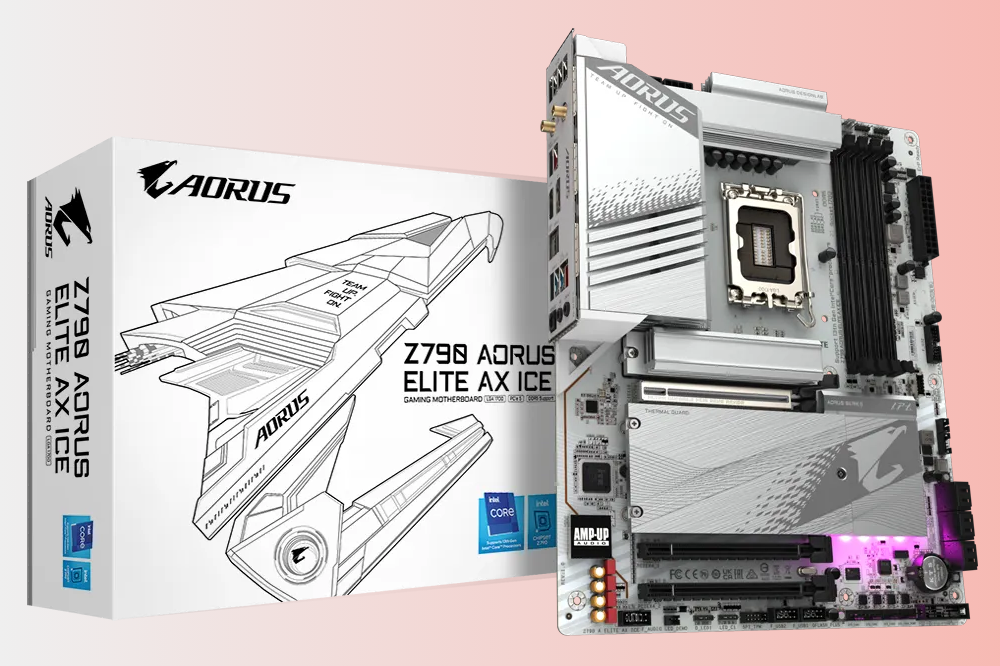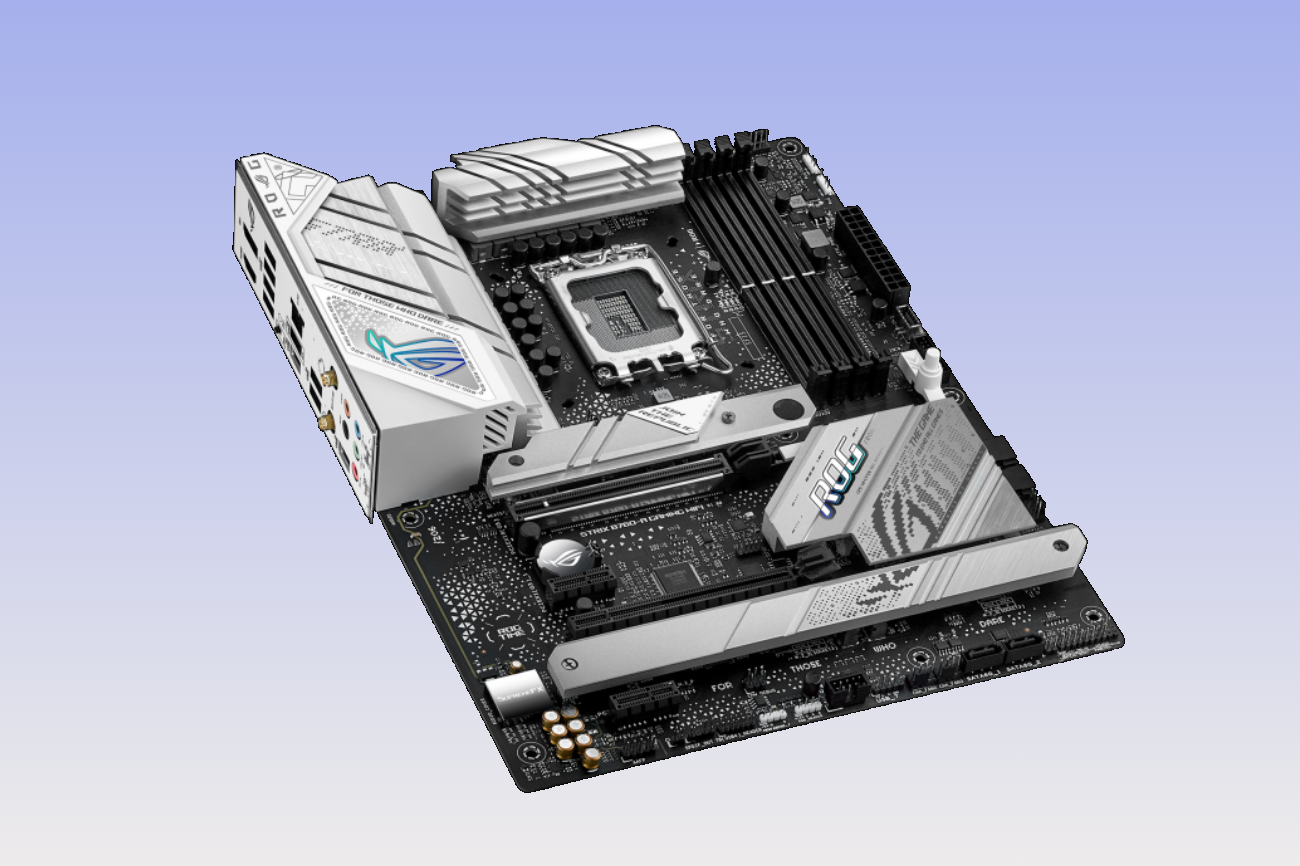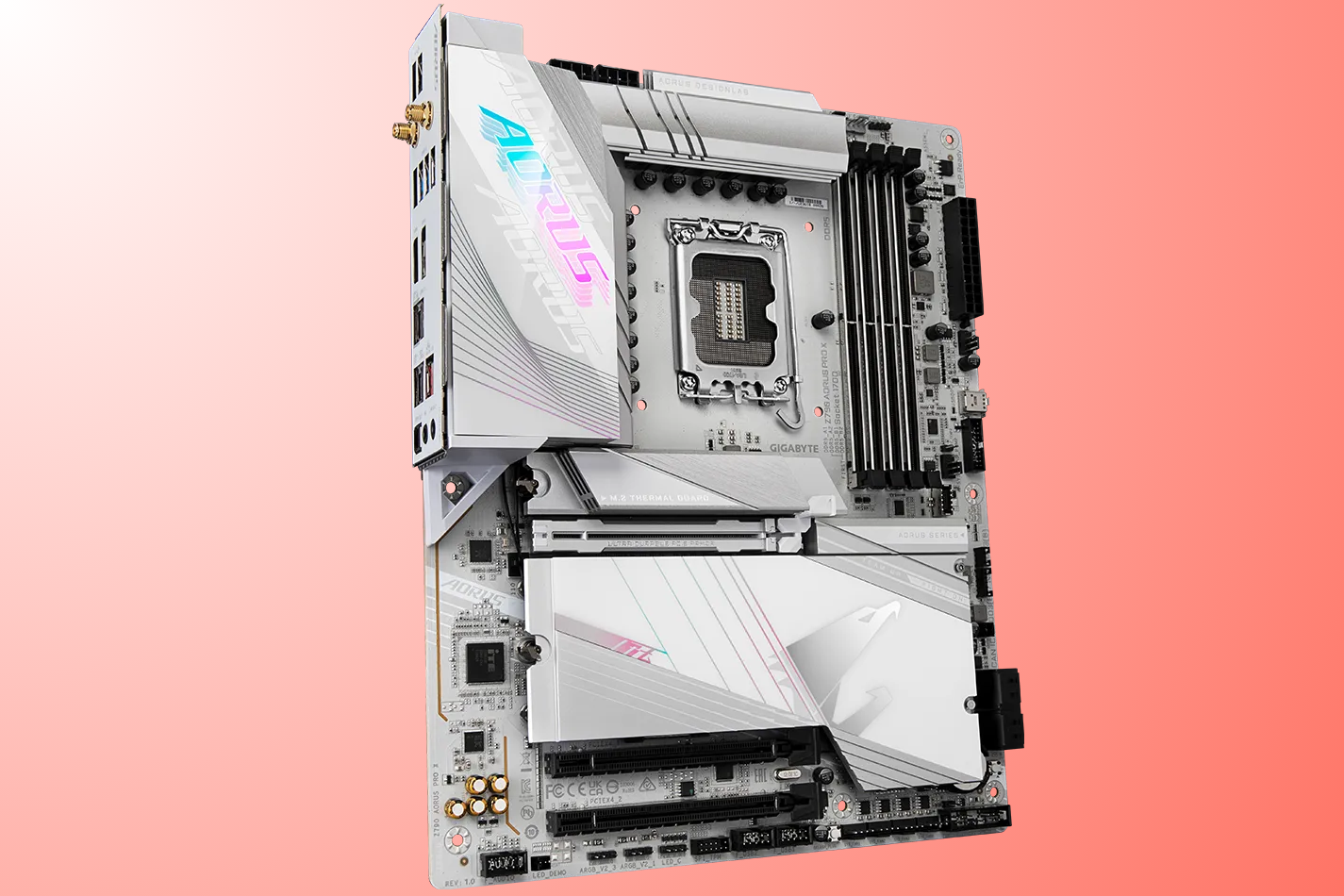The dark palette of your typical motherboard is nice, but striking, icy white motherboards can really make your components pop. Of course, it’s purely aesthetics and doesn’t offer any performance benefits, but if you want a specific color scheme for your build, the best white motherboards are a good place to start.
Best AMD Overall: ASUS ROG Strix X670E-A
If you’re putting together a high-performance AMD build, the ASUS ROG Strix X670E-A is, without a doubt, the strongest contender, especially paired with a powerful NVIDIA or AMD GPU. With its available ports, overclock support, and a bevy of heatsinks, you can really push your rig.
Want faster load times, smoother gameplay, and a snappier OS? Given its two Gen 5-ready NVMe slots, you can use one for your OS and another for storing your favorite games. As a bonus, there are also two Gen 4 M.2 slots, which are quite useful for older games or ones you only play occasionally.
The ASUS ROG Strix X670E-A is fitted with an AM5 socket, giving you access to AMD’s powerful Ryzen 7000 series CPUs. That kind of power can run hot, so be sure to install one of the best AIO coolers, too. It even comes with SafeSlot technology, a feature that should be standard since it helps avoid shearing your GPU, especially if it’s girthy.
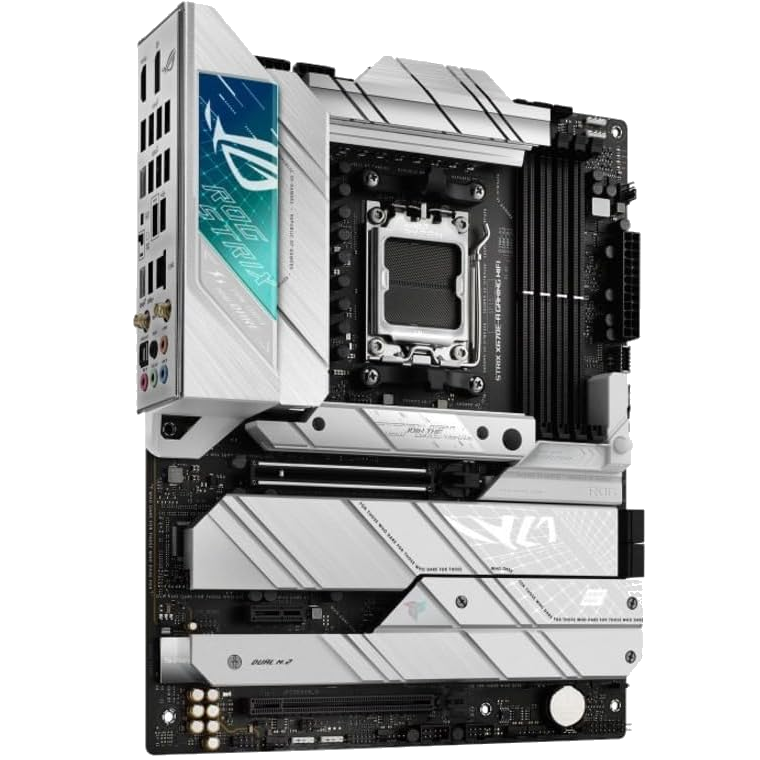
ASUS ROG Strix X670E-A Gaming WiFi
The ASUS ROG Strix X670E-A comes out on top, showing off its support for AM5 CPUs, a wealth of heatsinks, and a stylish off-white finish. Above all, it supports PCIe 5.0 for both SSDs and GPUs.
- Easy to work with, including the BIOS
- Supports DDR5 memory
- Can be hooked up to an AIO
- SafeSlot adds additional support to heavier GPUs
- Doesn't support Thunderbolt
Best Budget AMD: ASRock B650M Pro RS
Naturally, budget AMD builds come with sacrifices. Luckily, ASRock did an excellent job designing the B650M Pro RS by tightening up its features while still providing many worthwhile benefits.
For example, while you’re limited to PCIe 4.0 for GPUs, which isn’t a bad thing to begin with, you gain an AM5 socket and DDR5 support in return, the latter of which you can overclock. While its socket does limit your choices to AMD’s Ryzen 7000 series lineup, the ASRock B650M Pro RS is so competitively priced you won’t have a problem finding a CPU that fits your budget.
Finally, the “Blazing M.2,” as ASRock likes to call it, puts a beautiful bow on the whole package. Ancient HDDs and even lesser SSDs can’t hold a candle to Gen 5 speeds. You not only experience a far more responsive OS, but gaming gains a big boost as well.
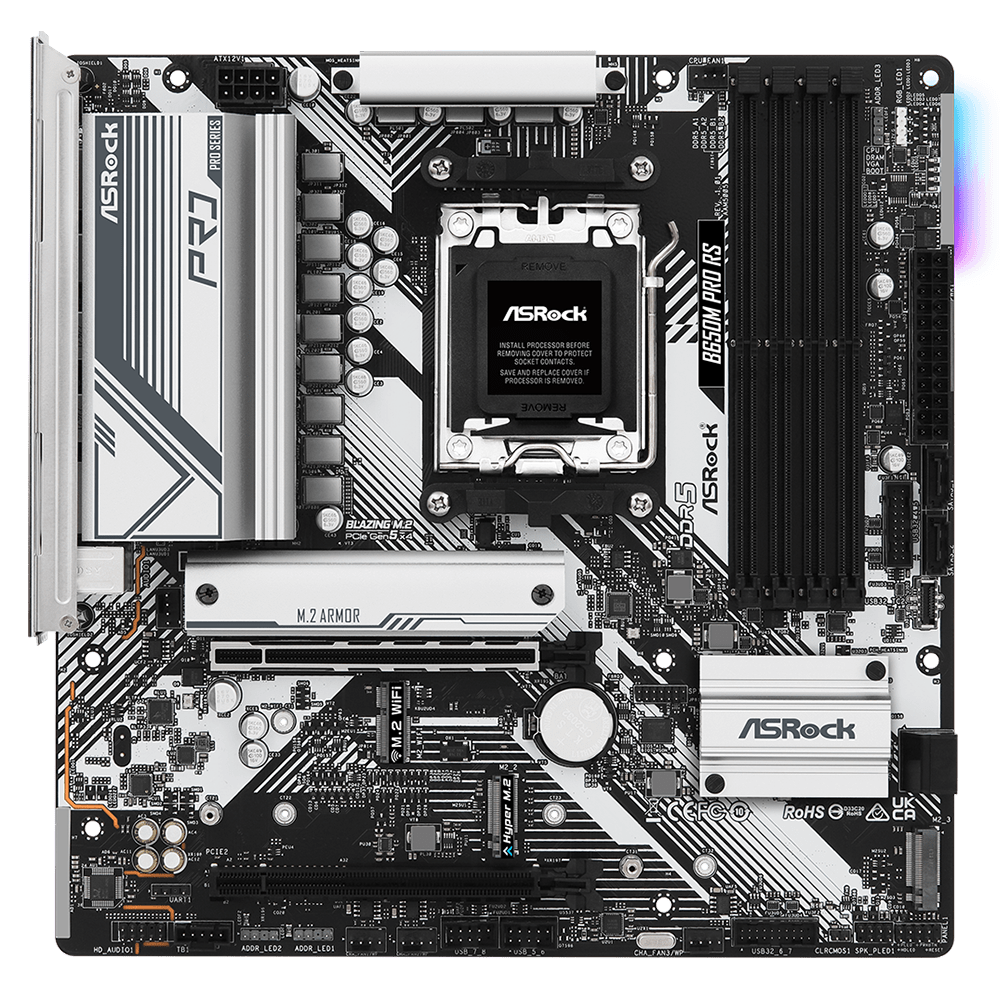
ASRock B650M Pro RS WiFi
For any budding PC builder on a budget, the ASRock B650M Pro RS is one of the most straightforward, user-friendly motherboards you can work with. It isn't oversaturated with ports but instead has everything you need to make a high-end AMD build.
- Great option for compact builds
- Can overclock RAM
- Solid set of ports, including USB-C
- Can save a little more going with the non-WiFi option
- Limited to Ryzen 7000 series CPUs
Best Intel Overall: Gigabyte Z790 Aorus Elite AX ICE
The Gigabyte Z790 Aorus Elite AX ICE takes aesthetics to the next level, painting the whole board in varying shades of white, silver, and a splash of color for good measure. Luckily, it performs just as well as it looks, especially if your goal is to build a high-end Intel machine.
Take the CPU socket. The Gigabyte Z790 Aorus Elite AX ICE features LGA 1700, supporting both 13th and 14th-Gen Intel processors, which pairs wonderfully with its PCIe Gen 5 graphics card slot. In other words, you’ll be able to take advantage of the best Intel processors and GPUs on the market.
he Gigabyte Z790 Aorus Elite AX ICE also has a wealth of features outside of performance. Its support for ARGB means you can go above and beyond with personalization, even more so paired with one of the best white PC cases. And if you plan on using high-end components, all that extra thermal shielding on the MOBO goes a long way in keeping everything nice and cool.
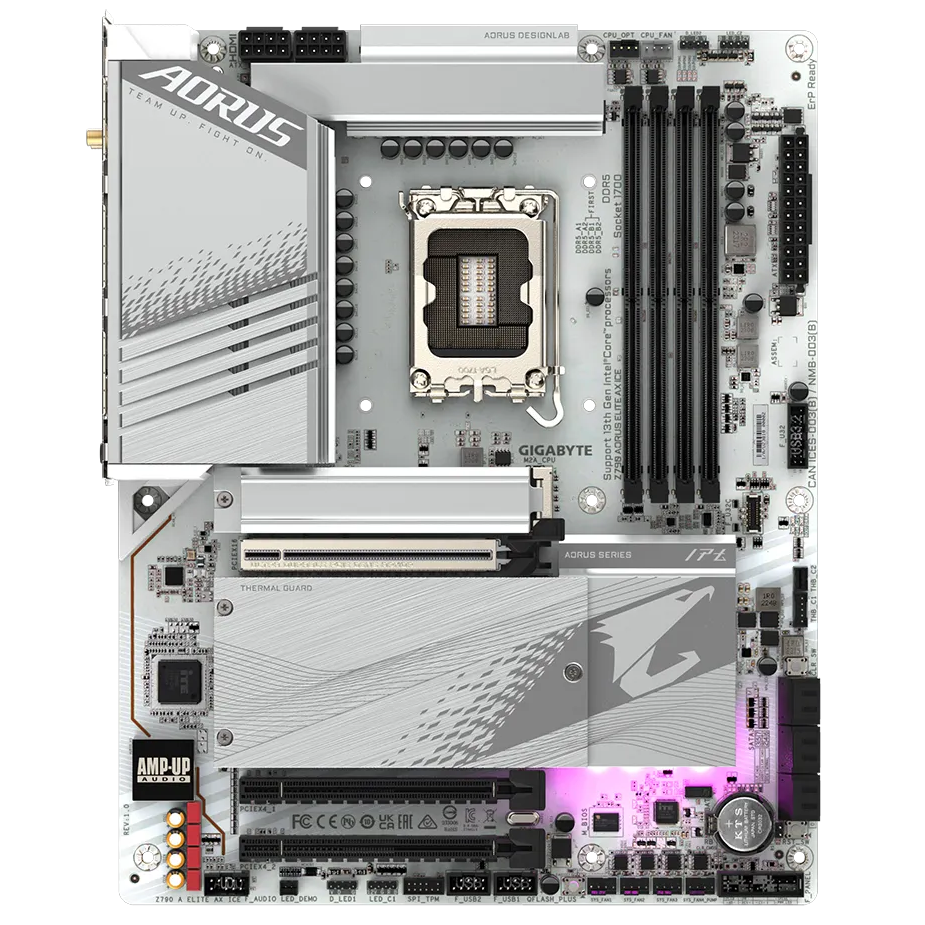
Gigabyte Z790 AORUS Elite AX ICE
With a wealth of features, the Gigabyte Z790 AORUS Elite AX ICE has so few shortcomings. Not only is it user-friendly, but it sets you up for major upgrades down the road, such as 14th Gen Intel processors and PCIe Gen 5-ready GPUs.
- Great to work with, given its Q-Flash Plus and EZ-Latch Plus
- Four M.2 connectors
- Good selection of ports
- PCIe 5.0 slot is backward compatible with PCIe 4.0
- PCIe Gen 5 graphics cards aren't available yet
- SSD limited to PCIe Gen 4 speeds
Best Budget Intel: ASUS ROG Strix B760-A
For a more budget-oriented Intel build, the ASUS ROG Strix B760-A is a far more economical approach but offers a decent set of ports, Wi-Fi 6E capabilities, and support for GPUs that can take advantage of PCIe 5.0.
The ASUS ROG Strix B760-A features an LGA 1700 socket, allowing you to pick between 12th and 13th Gen Intel CPUs. This not only gives you the option to settle with a cheaper model—think Intel’s 12400F—but also offers upgrade paths for the future. Just be sure to take advantage of the onboard water cooling header!
Best of all, the ASUS ROG Strix B760-A is surprisingly easy to work with. Not only does it feature a BIOS FlashBack button but also a Q-Release and Q-Latch, making ejecting your GPU and M.2 painless and, more importantly, avoiding unwanted damage.
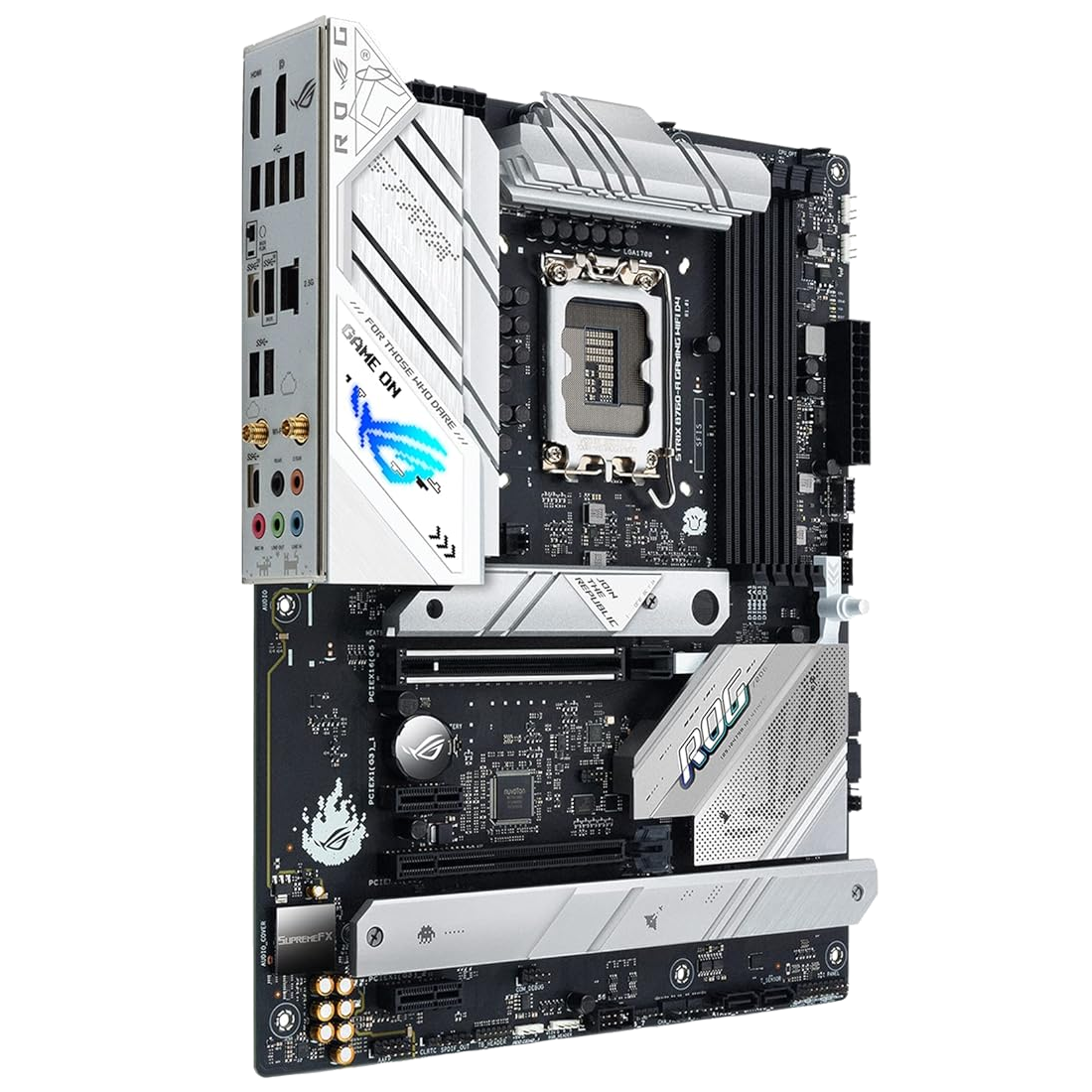
ASUS ROG Strix B760-A Gaming WiFi D4
Given its user-friendly features, price, and LGA 1700 socket, the ASUS ROG Strix B760-A is the perfect option when budget is your concern first and foremost. Additionally, its PCIe 5.0 x16 means you can also strap it with a powerful GPU.
- Good selection of ports, including HDMI 2.1
- Heatsinks for VRM, M.2, and chipset
- Can be hooked up to an AIO
- Three M.2 slots
- M.2 slots are limited to PCIe 4.0 speeds
- Limited to DDR4 memory
Best for Gaming: Gigabyte Z790 AORUS Pro X
If the ultimate gaming rig is what you’re after, the Gigabyte Z790 AORUS Pro X doesn’t leave anything on the cutting room floor. It sets you up for the best GPUs and CPUs on the market right now, as well as for better upgrades down the road.
Case in point, the Gigabyte Z790 AORUS Pro X is rocking PCIe 5.0 for both GPUs and SSDs. While the list of GPUs that take advantage of the extra bandwidth is admittedly short, the slot is backward compatible with PCIe 4.0, which is still home to some of the best GPUs, like NVIDIA’s RTX 40 series, as well as more budget-oriented options.
Equally important are the little traits that make the Gigabyte Z790 AORUS Pro X a joy to work with. Its support for ARGB means you can put together a rig that’s as gaudy as you want with the best RGB fans. Additionally, the built-in Q-Flash Plus button is a massive time-saver, as you won’t need to build the PC in order to update the BIOS.
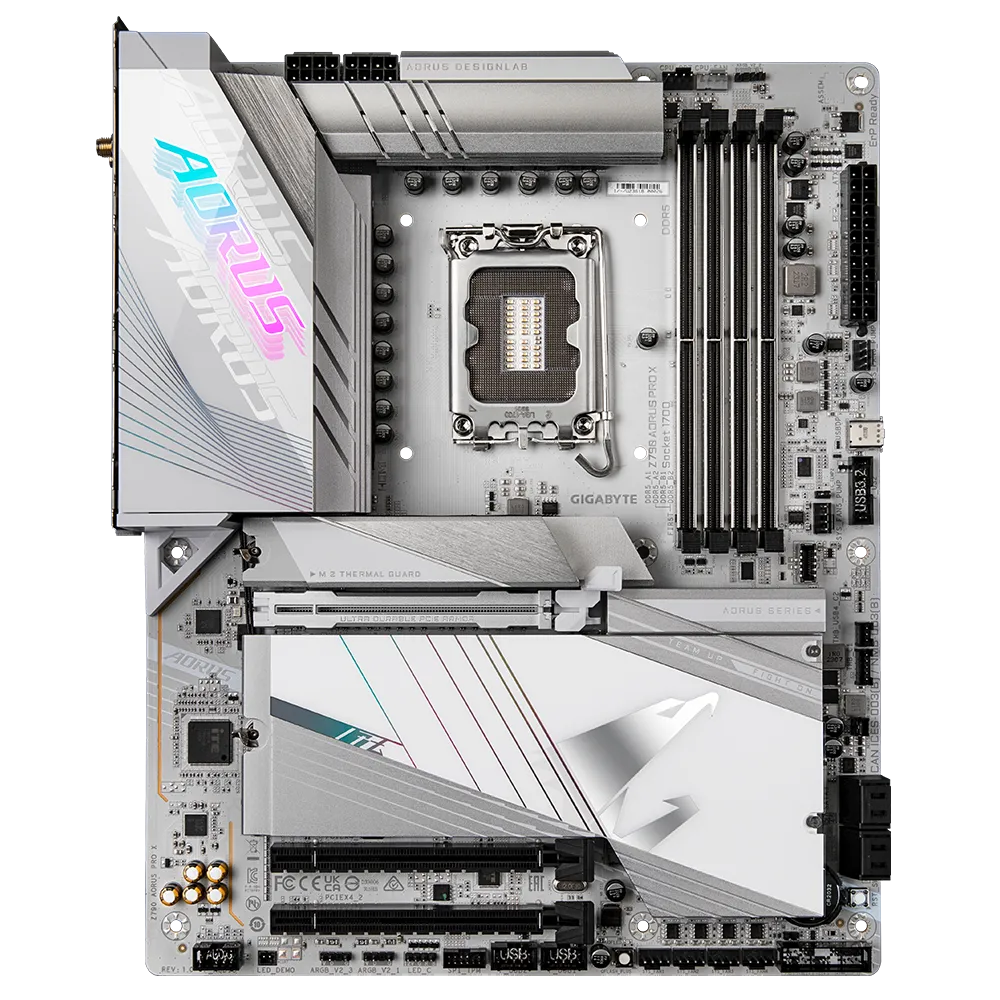
Gigabyte Z790 AORUS Pro X
The Gigabyte Z790 AORUS Pro X comes with all the bells and whistles you could ever ask for, from PCIe 5.0 for GPUs to 14th-gen Intel CPU support. It also features plenty of heatsinks for additional cooling,
- Compatible with 12th, 13th, and 14th Gen Intel CPUs
- Supports DDR5
- 5GB LAN and Wi-Fi 7
- Q-Flash Plus is handy for updating BIOS
- All those features come at a price
FAQ
Q: Does the color of your motherboard matter?
The color of your motherboard is purely cosmetic and does not affect its performance or durability. Most people prefer a motherboard that matches the color of their computer build or desk peripherals. A white motherboard will give your PC a clean, stunning look that blends well in different setups.
Q: What does a white motherboard mean?
A white motherboard is a motherboard with a predominantly white color scheme. While the PCB is usually black on most motherboards, the rest of the components, like heatsinks, VRM cover, and I/O shield, are primarily white.
Q: How do I know which motherboard I need for my PC?
It depends entirely on your CPU and GPU. If you haven't decided on those components yet, do that first. Start by picking a processor (AMD or Intel) and then choosing a suitable graphics card. Once you've got that settled, you can start narrowing your search; in fact, our guide on motherboard specifications and their meanings breaks down the process succinctly!
Q: What does the motherboard do on my PC?
The motherboard allows communication between all the components, from USB ports to the graphics card.
Q: How can I tell if my motherboard has gone bad?
If your motherboard has been giving you issues, it may give off a beep, fail to post, or have onboard LEDs that light up if there's a problem with your GPU, CPU, hard drive, and RAM. That's only the tip of the iceberg, though, so if you're attempting to troubleshoot your MOBO, it's best to get familiar with the signs that your motherboard is dead.
Q: Can I use any CPU with any motherboard?
No. A motherboard's CPU socket will only accept one of two processors: Intel or AMD. You can't use an AMD processor with an Intel socket and vice versa. Now, that still doesn't mean you can use any processor if, say, you have an Intel CPU and an Intel-based motherboard, as they'll only accept specific generations.
Q: What does CPU stand for?
CPU is an acronym for "central processing unit." The CPU is analogous to the brain, carrying out the various tasks and processing data.
Q: Does the size of the motherboard matter?
Not at all. Board size doesn't impact performance. You can get the same baseline features, whether it's a mini-ITX or the largest E-ATX. The size of the motherboard only comes into play when it comes to whether it can fit in your PC case.
Q: Why are most motherboards green?
Like many of the components, motherboards are quite delicate, given all the bits of electronics and tracks that connect the board's various functions, which you can see if you take a closer look. To add a level of protection, motherboards are encased in a thin resin—the solder mask—and these take on a variety of colors, including green. It's both aesthetically pleasing and pretty useful for making the electronics stand out.

